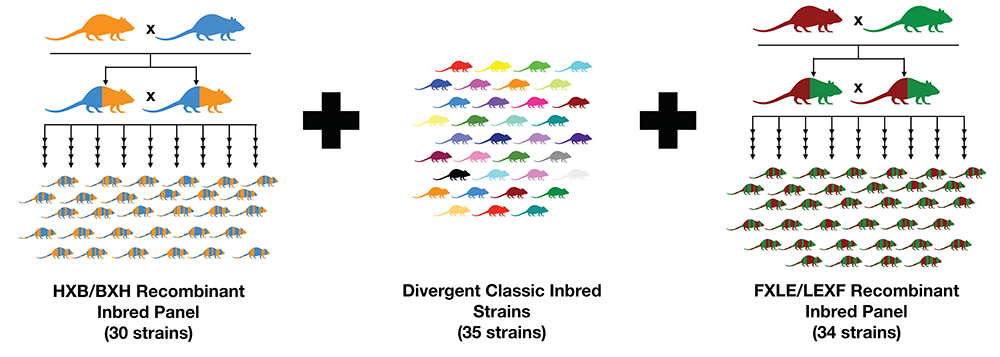The Hybrid Rat Diversity Panel |
 |
| The Hybrid Rat Diversity Panel (HRDP) is a panel of 96 inbred rat strains carefully chosen to maximize power to detect specific genetic loci associated with a complex trait and to maximize the genetic diversity among strains. The HRDP includes 33 genetically diverse inbred strains of rat and two panels of recombinant inbred rat strains, the FXLE/LEXF (33 strains) from Japan and the HXB/BXH (30 strains) from the Czech Republic. Recombinant inbred strains are panels of inbred strains derived from two inbred parental rat strains. The two parental strains are crossed to produce F1 pups. F1 pups are subsequently intercrossed to create an F2 generation. These genetically unique F2 generation rats are paired as founders and brother-sister mated for at least 20 generations to fix their genomes. The two RI panels used in the HRDP have been well characterized through studies focused on seizures, epilepsy, lymphoma and leukemia, blood pressure regulation, metabolic syndrome, and alcohol consumption. The HXB/BXH recombinant inbred strains were derived from the Spontaneously Hypertensive Rat (SHR/Olalpcv) and the normotensive BN-Lx (BN-Lx/Cub), a Brown Norway congenic rat strain with polydactyly-luxate syndrome. The FXLE x LEXF recombinant inbred strains were derived from the Long Evans strain (LE/Stm) and the Fischer F344 strain (F344/Stm). Notes:
Quantitative phenotype measurements are available for many of the HRDP strains. Click here to explore this data in RGD’s PhenoMiner tool. Select a measurement or a phenotype category on the resulting page to view a graph of the data.
|
| Divergent Classic Inbred Strains | |||||||
|---|---|---|---|---|---|---|---|
| Strain | RGD ID |  |
Strain | RGD ID |  |
Strain | RGD ID |
| ACI/EurMcwi* ‡ | 7364991 |  |
HTX/Kyo | 1302600 |  |
PD/Cub | 728161 |
| BDIX/NemOda | 2304285 |  |
LE/Stm* | 629485 |  |
PVG/Seac* | 1302722 |
| BN/NHsdMcwi* ‡ | 61498 |  |
LEW/Crl* | 737932 |  |
RCS/LavRrrc | 1358258 |
| BN-Lx/Cub* | 61117 |  |
LH/MavRrrc* | 60990 |  |
SBH/Ygl | 631572 |
| BUF/Mna* ‡ | 61118 |  |
LL/MavRrrc* | 68077 |  |
SBN/Ygl | 631573 |
| COP/CrCrl | 1358153 |  |
LN/MavRrrc* | 61015 |  |
SHR/OlaIpcv* | 631848 |
| DA/OlaHsd* | 734475 |  |
LOU/MNCr | 9999143 |  |
SHRSP/A3NCrl* | 2311051 |
| F344/DuCrl* ‡ | 734478 |  |
M520/N* ‡ | 10024 |  |
SR/JrHsd* | 1582184 |
| F344/Stm* | 1302686 |  |
MNS/N | 2307319 |  |
SS/JrHsdMcwi* | 61499 |
| FHH/EurMcwi* | 629509 |  |
MR/N* ‡ | 70449 |  |
WAG/RijCrl* ‡ | 2312498 |
| GK/FarMcwi* | 10395297 |  |
MWF/Hsd* | 737906 |  |
WKY/NCrl* ‡ | 1358112 |
| SHR and BN-Lx derived RI strains |   |
Long Evans and F344 derived RI strains | ||||||||
|---|---|---|---|---|---|---|---|---|---|---|
| Strain | RGD ID |  |
Strain | RGD ID |   |
Strain | RGD ID |  |
Strain | RGD ID |
| BXH/lpcv RI panel | 61098 |  |
HXB/lpcv RI panel | 61099 |   |
FXLE/Stm RI panel | 7244374 |  |
LEXF/Stm RI panel | 629500 |
| BXH2/CubMcwi* | 149735530 |  |
HXB1/Ipcv | 2307094 |   |
FXLE12/Stm | 1302602 |  |
LEXF1A/Stm* | 1302641 |
| BXH3/CubMcwi* | 149735533 |  |
HXB-1-43/Ipcv | 68049 |   |
FXLE13/Stm | 1302665 |  |
LEXF1B/Stm | 4140413 |
| BXH5/Cub | 2307115 |  |
HXB2/IpcvMcwi* | 149735520 |   |
FXLE14/Stm | 1302615 |  |
LEXF1C/Stm* | 1302666 |
| BXH6/Cub | 2307136 |  |
HXB3/Ipcv | 2307079 |   |
FXLE15/Stm | 1302673 |  |
LEXF1D/Stm | 4140412 |
| BXH8/Cub | 2307126 |  |
HXB4/IpcvMcwi* | 149735518 |   |
FXLE16/Stm* | 1302619 |  |
LEXF2A/Stm | 1302605 |
| BXH9/Cub | 2307129 |  |
HXB5/Ipcv | 2307099 |   |
FXLE17/Stm | 1302708 |  |
LEXF2B/Stm* | 1302710 |
| BXH10/Cub | 2307124 |  |
HXB7/Ipcv | 2307086 |   |
FXLE18/Stm* | 1302682 |  |
LEXF2C/Stm | 1302646 |
| BXH11/Cub | 2307127 |  |
HXB10/IpcvMcwi* | 38549351 |   |
FXLE19/Stm | 1302690 |  |
LEXF2D/Stm | 7349321 |
| BXH12-1/Cub | 2307139 |  |
HXB13/Ipcv | 2307091 |   |
FXLE20/Stm | 1302633 |  |
LEXF3/Stm* | 1302707 |
| BXH12-2/Cub | 2307133 |  |
HXB14/Ipcv | 2307092 |   |
FXLE21/Stm | 1302607 |  |
LEXF4/Stm* | 1302604 |
| BXH13/Cub | 2307123 |  |
HXB15/Ipcv | 2307095 |   |
FXLE22/Stm | 1302683 |  |
LEXF5/Stm | 1302723 |
 |
HXB17/Ipcv | 2307085 |   |
FXLE23/Stm | 1302601 |  |
LEXF6A/Stm | 4140405 | ||
 |
HXB18/Ipcv | 2307082 |   |
FXLE24/Stm | 1302611 |  |
LEXF6B/Stm | 1302617 | ||
 |
HXB20/IpcvMcwi* | 149735521 |   |
FXLE25/Stm | 1302603 |  |
LEXF7A/Stm | 1302652 | ||
 |
HXB21/Ipcv | 2307097 |   |
FXLE26/Stm | 1302598 |  |
LEXF7B/Stm | 1302649 | ||
 |
HXB22/Ipcv | 2307088 |   |
 |
LEXF7C/Stm | 1302597 | ||||
 |
HXB23/Ipcv | 2307093 |   |
 |
LEXF8A/Stm | 1302653 | ||||
 |
HXB24/Ipcv | 2307084 |   |
 |
LEXF8B/Stm | 7349322 | ||||
 |
HXB25/Ipcv | 2307098 |   |
 |
LEXF8C/Stm | 4140408 | ||||
 |
HXB27/Ipcv | 2307078 |   |
 |
LEXF8D/Stm | 1302699 | ||||
 |
HXB29/Ipcv | 2307089 |   |
 |
LEXF9/Stm | 1302618 | ||||
 |
HXB31/IpcvMcwi* | 149735519 |   |
 |
LEXF10A/StmMcwi* | 149735517 | ||||
 |
  |
 |
LEXF10B/Stm | 1302616 | ||||||
 |
  |
 |
LEXF10C/Stm | 1302612 | ||||||
 |
  |
 |
LEXF11/Stm* | 1302638 | ||||||





















